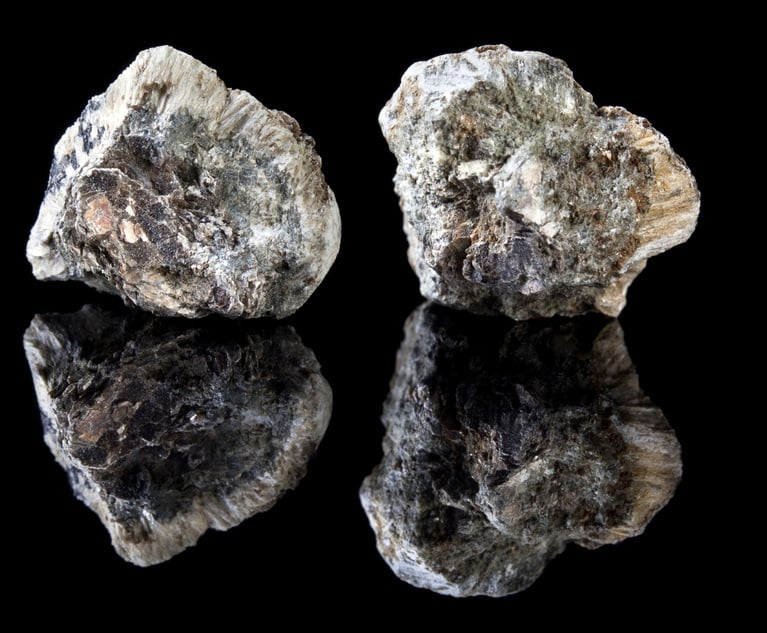Judge Doubles Fracking Workers' Award in Overtime Case
A federal judge has doubled the compensation awarded to four fracking crane operators who sued a drilling company for failing to pay overtime wages.
December 01, 2017 at 04:13 PM
3 minute read

A federal judge has doubled the compensation awarded to four fracking crane operators who sued a drilling company for failing to pay overtime wages.
U.S. District Judge Mark Kearney of the Western District of Pennsylvania granted the plaintiffs' post-trial motion for liquidated damages in Mozingo v. Oil States Energy Services. In October, a jury found Oil States Energy Services “willfully and recklessly” failed to pay overtime wages to the operators, and awarded them each tens of thousands of dollars in compensation.
“As a matter of public policy, Congress mandates these liquidated damages unless the employer shows it subjectively acted in good faith in trying to comply with the law and its attempts to comply with the law are objectively reasonable,” Kearney wrote in his opinion.
“When, as here, the employer disputes its legal obligation but does not show good-faith efforts to comply with the law or demonstrate reasonable efforts to comply with the law, we must follow the congressional mandate,” he continued. “We grant the employees' post-trial motion for liquidated damages and double the amount of the jury's unanimous award of overtime compensation to the four crane operators.”
According to Kearney, Oil State misclassified the crane operators as exempt. The company argued they were “highly compensated” and exempt under the Motor Carrier Act.
To avoid liquidated damages, Oil States would have had to prove that it tried to reasonably comply with the act, and it argued that its payment plan did just that.
“Oil States argues paying crane operators a salary and a job bonus, instead of hourly with overtime, conformed to industry standard practice and thus shows good faith. … Oil States offered no evidence it independently researched whether the industry standard salary and job pay plan for crane operators complied with the act,” Kearney said.
The judge also held that Oil States did not act in good faith by determining that the employees were exempt under the highly compensated exemption.
“For the highly compensated exception, Oil States argues it reasonably believed the crane operators were 'deemed exempt' because it paid the crane operators over $100,000 a year meaning it was not required to evaluate the nature of the crane operators' specific duties under the act. Oil States argued even if the jury found it made the wrong call, because it is a 'close call,' we should find its belief objectively reasonable,” Kearney said.
He added that Third CIrcuit case law requires the employer produce “record evidence” of implementing a pay plan because it believed it complied with the act relying on “some pervasive legal uncertainty concerning the exemption status of its employees.”
“Oil States offered no testimony its human resource employees even knew of the legal uncertainty around the highly compensated exemption let alone researched conflicting legal authority and made a good-faith effort to rely on a reasonable interpretation,” Kearney said. “While Oil States' counsel ably argues there is uncertainty in caselaw, there is no evidence an Oil States employee knew of these uncertainties before litigation began.”
A. Patricia Diulus-Myers represented Oil States and Joseph Chivers represented the workers. Neither responded to requests for comment.
This content has been archived. It is available through our partners, LexisNexis® and Bloomberg Law.
To view this content, please continue to their sites.
Not a Lexis Subscriber?
Subscribe Now
Not a Bloomberg Law Subscriber?
Subscribe Now
NOT FOR REPRINT
© 2025 ALM Global, LLC, All Rights Reserved. Request academic re-use from www.copyright.com. All other uses, submit a request to [email protected]. For more information visit Asset & Logo Licensing.
You Might Like
View All
Superior Court Rejects Pa. Hospital's Challenge to $7.3M Med Mal Judgment
3 minute read
Pittsburgh Judge Rules Loan Company's Online Arbitration Agreement Unenforceable
3 minute read
Pa. High Court to Weigh Parent Company's Liability for Dissolved Subsidiary's Conduct
3 minute read
Trending Stories
- 1Trump Signs Executive Order Creating Strategic Bitcoin Reserve
- 2St. Jude Labs Sued for $14.3M for Allegedly Falling Short of Purchase Expectations
- 3'Ridiculously Busy': Several Law Firms Position Themselves as Go-To Experts on Trump’s Executive Orders
- 4States Reach New $7.4B Opioid Deal With Purdue After SCOTUS Ruling
- 5$975,000 Settlement Reached After Fall on Sidewalk
Who Got The Work
J. Brugh Lower of Gibbons has entered an appearance for industrial equipment supplier Devco Corporation in a pending trademark infringement lawsuit. The suit, accusing the defendant of selling knock-off Graco products, was filed Dec. 18 in New Jersey District Court by Rivkin Radler on behalf of Graco Inc. and Graco Minnesota. The case, assigned to U.S. District Judge Zahid N. Quraishi, is 3:24-cv-11294, Graco Inc. et al v. Devco Corporation.
Who Got The Work
Rebecca Maller-Stein and Kent A. Yalowitz of Arnold & Porter Kaye Scholer have entered their appearances for Hanaco Venture Capital and its executives, Lior Prosor and David Frankel, in a pending securities lawsuit. The action, filed on Dec. 24 in New York Southern District Court by Zell, Aron & Co. on behalf of Goldeneye Advisors, accuses the defendants of negligently and fraudulently managing the plaintiff's $1 million investment. The case, assigned to U.S. District Judge Vernon S. Broderick, is 1:24-cv-09918, Goldeneye Advisors, LLC v. Hanaco Venture Capital, Ltd. et al.
Who Got The Work
Attorneys from A&O Shearman has stepped in as defense counsel for Toronto-Dominion Bank and other defendants in a pending securities class action. The suit, filed Dec. 11 in New York Southern District Court by Bleichmar Fonti & Auld, accuses the defendants of concealing the bank's 'pervasive' deficiencies in regards to its compliance with the Bank Secrecy Act and the quality of its anti-money laundering controls. The case, assigned to U.S. District Judge Arun Subramanian, is 1:24-cv-09445, Gonzalez v. The Toronto-Dominion Bank et al.
Who Got The Work
Crown Castle International, a Pennsylvania company providing shared communications infrastructure, has turned to Luke D. Wolf of Gordon Rees Scully Mansukhani to fend off a pending breach-of-contract lawsuit. The court action, filed Nov. 25 in Michigan Eastern District Court by Hooper Hathaway PC on behalf of The Town Residences LLC, accuses Crown Castle of failing to transfer approximately $30,000 in utility payments from T-Mobile in breach of a roof-top lease and assignment agreement. The case, assigned to U.S. District Judge Susan K. Declercq, is 2:24-cv-13131, The Town Residences LLC v. T-Mobile US, Inc. et al.
Who Got The Work
Wilfred P. Coronato and Daniel M. Schwartz of McCarter & English have stepped in as defense counsel to Electrolux Home Products Inc. in a pending product liability lawsuit. The court action, filed Nov. 26 in New York Eastern District Court by Poulos Lopiccolo PC and Nagel Rice LLP on behalf of David Stern, alleges that the defendant's refrigerators’ drawers and shelving repeatedly break and fall apart within months after purchase. The case, assigned to U.S. District Judge Joan M. Azrack, is 2:24-cv-08204, Stern v. Electrolux Home Products, Inc.





